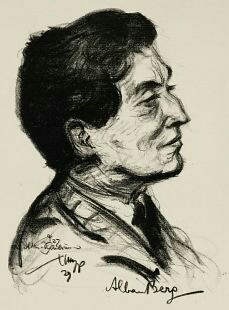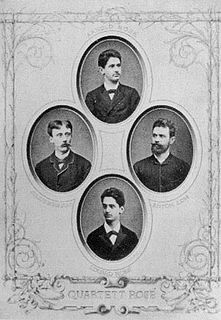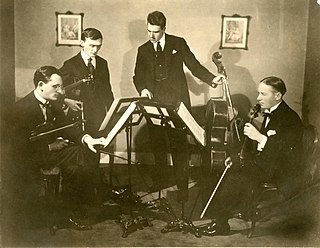This article needs additional citations for verification .(February 2022) |
The Fred Sherry String Quartet is an American classical string quartet.
This article needs additional citations for verification .(February 2022) |
The Fred Sherry String Quartet is an American classical string quartet.
The quartet was founded by cellist Fred Sherry to perform and record the four string quartets of Arnold Schoenberg. He appears on all recordings by the quartet. The other members of the quartet have varied over time. They have included:
Mr. Sherry also formed a string sextet consisting of Leila Josefowicz and David Chan (violins), Paul Neubauer and Yura Lee (violas) and himself and Michael Nicolas (cellos) for the recording of Schoenberg's Verklärte Nacht .
The Fred Sherry String Quartet has also recorded Schoenberg's Concerto for String Quartet and the Ode to Napoleon Buonaparte for Voice, Piano and String Quartet, Op. 41 as well as Anton Webern's String Quartet, Op. 28 and 6 Bagatelles, Op. 9.

A string orchestra is an orchestra consisting solely of a string section made up of the bowed strings used in Western Classical music. The instruments of such an orchestra are most often the following: the violin, which is divided into first and second violin players, the viola, the cello, and usually, but not always, the double bass.

In classical music, a string sextet is a composition written for six string instruments, or a group of six musicians who perform such a composition. Most string sextets have been written for an ensemble consisting of two violins, two violas, and two cellos.

The Lyric Suite is a six-movement work for string quartet written by Alban Berg between 1925 and 1926 using methods derived from Arnold Schoenberg's twelve-tone technique. Though publicly dedicated to Alexander von Zemlinsky, the work has been shown to possess a "secret dedication" and to outline a "secret programme".

Verklärte Nacht, Op. 4, is a string sextet in one movement composed by Arnold Schoenberg in 1899. Composed in just three weeks, it is considered his earliest important work. It was inspired by Richard Dehmel's poem of the same name, combined with the influence of Schoenberg's strong feelings upon meeting Mathilde von Zemlinsky, whom he would later marry. The movement can be divided into five distinct sections which refer to the five stanzas of Dehmel's poem; however, there are no unified criteria regarding movement separation.
The Concerto for String Quartet and Orchestra in B-flat is a work by the Austrian composer Arnold Schoenberg, freely composed after the Concerto Grosso Op. 6, No. 7 by George Frideric Handel.
The Hollywood String Quartet (HSQ) was an American string quartet founded by violinist/conductor Felix Slatkin and his wife cellist Eleanor Aller. The Hollywood String Quartet is considered to be the first American-born and trained classical music chamber group to make an international impact, mainly through its landmark recordings. These recordings have long been regarded as among the most outstanding recorded performances of the string quartet repertoire.
Richard G. Swift was an American composer and music theorist.
The Group for Contemporary Music is an American chamber ensemble dedicated to the performance of contemporary classical music. It was founded in New York City in 1962 by Joel Krosnick, Harvey Sollberger and Charles Wuorinen and gave its first concert on October 22, 1962 in Columbia University's MacMillin Theatre. Krosnik left the ensemble in 1963. It was the first contemporary music ensemble based at a university and run by composers.

Dial Records was an American record company and label that specialized first in bebop jazz and then in contemporary classical music. It was founded in 1946 by Ross Russell. Notable artists who recorded for Dial include Charlie Parker, who signed an exclusive one-year recording contract with Russell on 26 February 1946, as well as Miles Davis, Max Roach, and Milt Jackson. Dial Records initially pressed its music for the Tempo Music Shop of Hollywood, California, but soon relocated to New York City.
The Spencer Dyke Quartet was a string quartet active in England through the 1920s. It was formed in 1918 and its personnel remained unchanged until August 1927 when Bernard Shore became the violist and Tate Gilder the second violin.It is best remembered now for a series of pioneering chamber music recordings made for the National Gramophonic Society. At the time of the recordings, the Quartet members were Edwin Spencer Dyke, Edwin Quaife, Ernest Tomlinson (viola) and Bertie Patterson Parker cello. Bernard Shore played viola in the last two recordings only.

The Rosé Quartet was a string quartet formed by Arnold Rosé in 1882.

Magick is an album of contemporary classical music by American avant-garde composer John Zorn.
The Virtuoso String Quartet was a British quartet, founded by the Gramophone Company in 1924 to be the first such quartet established specifically for recording. In effect they displaced the Catterall Quartet from their position recording for HMV.
Jennifer Frautschi is an American classical violinist, currently Artist-in-Residence at Stony Brook University. She plays an Antonio Stradivarius violin known as the "ex-Cadiz," dated to 1722 which a private American foundation gave to her on loan.

The Chamber Symphony No. 1 in E major, Op. 9 is a composition by Austrian composer Arnold Schoenberg.
Kurt George Roger was an Austrian–American composer.
This is a partial discography of composer Charles Wuorinen.

Guillaume Sutre is a French classical violinist.

Harry Waldo Warner was an English viola player and composer, one of the founding members of the London String Quartet and a several times Cobbett Award winner for his chamber music.